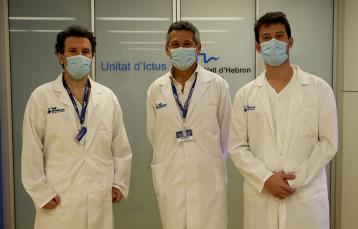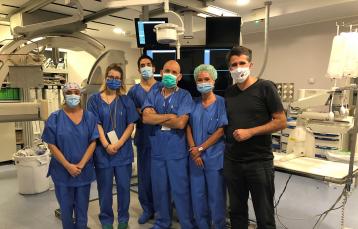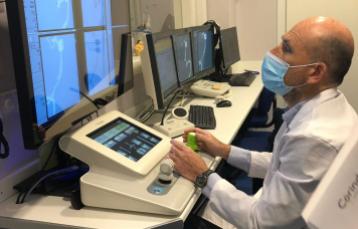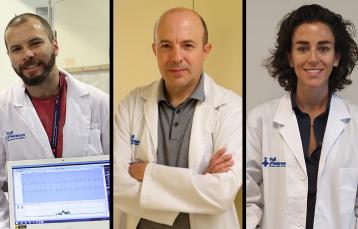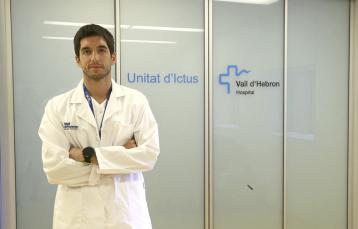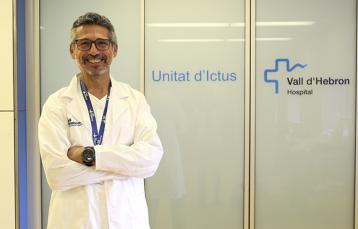Vall d'Hebron has included the first patients in a randomized multicenter clinical trial that will study whether a new, faster workflow can improve the outcome of stroke patients.The WE-TRUST (Workflow optimization to rEduce Time to endovascular Reperfusion for Ultra-fast Stroke Treatment) trial, with the participation of Royal Philips, will study the clinical impact of the ‘Direct to Angio Suite’ approach, enabled by a special scan in the Angio Suite developed by Philips. This approach combines stroke diagnosis and subsequent treatment in the same angiography suite, which the study will compare to the conventional workflow of diagnosing patients for treatment in the CT or MRI suite and then treating them in the angiography suite. The ‘Direct to Angio Suite’ approach can potentially reduce the time to treatment for stroke patients for whom every second counts.
“After suffering a stroke, fast time to treatment is paramount to giving patients the best possible outcomes. What we will learn about improving time to treatment in the WE-TRUST trial has the potential to significantly improve how acute stroke patients are diagnosed and treated”,said Dr. Raul Nogueira, Director, Neuroendovascular Service Marcus Stroke and Neuroscience Center at Grady Health in Atlanta, Georgia, and WE-TRUST co-Principal Investigator. With the help of an advanced brain scan technology in the Angio Suite, for example, researchers intend to eliminate the need for conventional CT or MRI scans for stroke triage in selected patients to save valuable time.
This multicenter, prospective, randomized, controlled, open-label, blinded-endpoint trial will take place across 15 sites and aims to enroll more than 560 patients in the United States, Brazil, Argentina, the Netherlands, France, Germany, Spain and Turkey. The trial is anticipated to be completed by 2023.
Stroke is the leading cause of disability
Globally, 1 in 4 adults over the age of 25 will have a stroke in their lifetime, making acute stroke, next to the second leading cause of death, a leading cause of serious long-term disability. Currently, when a possible stroke patient arrives at the Emergency Department, they typically first undergo a CT or MRI exam and, in the case of an ischemic stroke, are then treated in an interventional suite.
Outcomes for stroke patients are closely tied to how quickly they receive treatment: every 30 minutes’ delay before treatment reduces the chance of a good outcome by 14% and every hour of delay ages the brain by 3.6 years compared to a normally aging brain. Various single-center studies have already shown that a ‘Direct to Angio Suite’ workflow can result in time-savings up to 54 minutes with improved patient outcomes after 90 days.
The ‘Direct to Angio Suite’ workflow is enabled by an advanced brain scan in the Angio Suite, developed by Philips, that uses improved Cone-Beam Computed Tomography (CBCT) to improve image quality and facilitate triage of patients. This investigational device is based on Philips XperCT product and reconstructs the Stroke CBCT images using specially designed algorithms and filters to reduce artifacts caused by patient motion, bone beam hardening and metal objects.
“In a single center randomized clinical trial in our center, the ‘Direct to Angio Suite’ workflow has shown a significant improvement in clinical outcomes in patients who suffered a stroke”,said Dr. Marc Ribo, WE-TRUST co-Principal Investigator, Interventional Neurologist at the Vall d’Hebron University Hospital and researcher at the Stroke Research group at the Vall d’Hebron Research Institute (VHIR). “With the updated Stroke CBCT investigational device we can better facilitate triage of patients through improved image quality”.
The trial will primarily be carried out on Philips Image Guided Therapy System – Azurion – the company’s leading system for interventional procedures, at 15 leading stroke sites in Europe, Turkey, South America and the US. The primary endpoint of the WE-TRUST trial is clinical outcome measured by the patients’ cognitive function at three months after the procedure. More information about the study can be found at wetrust-study.com.
